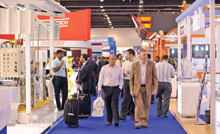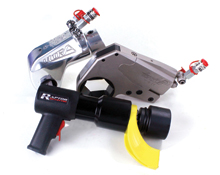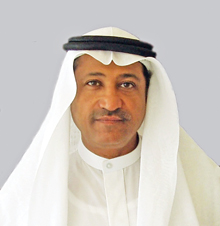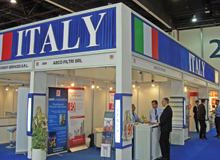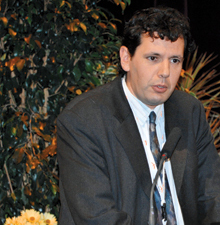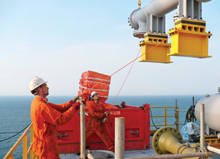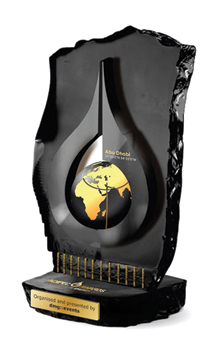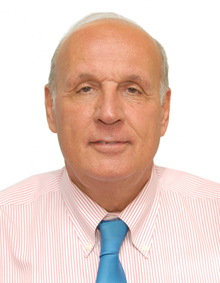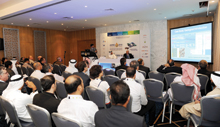
 Hague ... optimisation is the key
Hague ... optimisation is the key
REFINERIES in the Middle East face increasing market pressures that have driven them to cut operating costs while maximising throughput and minimising inventories. Decision-makers must navigate challenges that encompass operational issues, external market forces and delivering a specific product slate based on an optimal economic plan,” says AspenTech senior vice-president and managing director for Middle East and North Africa (Mena) John Hague in an exclusive interview with OGN.
According to him another related trend is greater focus on the downstream supply chain management processes and software tools, which result in significant benefits for the refinery. “Inefficient operations around the world do not generate the cash that companies need,” Hague says.
“Decision-makers have to deal with challenges ranging from operational issues, market forces and meeting the scheduled delivery of a product slate derived from an optimal economic plan. This has led to a great focus on the downstream supply chain management processes and tools, which result in significant benefits for the refinery. The key is producing products to an exact specification to be made available per a predictable, optimal plan,” he adds.
Excerpts:
Who are the key clients AspenTech is working with in the Middle East? Which parts of the region do you have a major presence in?
We are very deeply embedded with all the major oil companies in the region and we are making significant inroads in all the chemical companies in the region. Most of the international engineering majors that are all working in the region use our technology in the designs of the plants.
We had huge success across the UAE, last year. After the UAE, the No 2 market for us, last year, was Saudi Arabia where we got a lot of engagements on some of the new facilities that are coming online.
This was followed by Qatar. The national companies in Qatar use our engineering solutions quite broadly; they also use some of our advanced process control (APC) technology quite a bit, as well.
Over the years we have built close working relationships with Middle East oil, gas and chemical companies to help them optimise their assets and to drive operational process efficiencies. Today, the Middle East has a natural feedstock advantage position over other worldwide producers against the backdrop of a highly competitive and turbulent market. The Middle East is a key strategic region in AspenTech’s growth strategy for expanding its leadership position in the process optimisation market. AspenTech works with the following customers: Saudi Aramco, Sabic, BP, Shell, ExxonMobil, Bapco, Adnoc Group, Petrofac, KNPC, KOC, Qatar Petroleum, Qatar Gas, Qatar Chemicals, RasGas, Qatar Fertilizer, Orpic and many, many others.
How was the market for you last year? Do you expect a rise in profits in the current year?
From the time we came back into the region in 2010, the business has grown every year. Last year (Financial Year July 2012-June2013) was our best year since we have been here and this year – it looks like it is going to be much better than ever.
The engagement and the activities we are seeing are coming to a new level. The company, today, is more focused and organised around ‘engineering excellence’ which we are trying to achieve.
Since my move to the Middle East in October 2010, customers have expressed growing interest in standardising of process optimisation software that can help them implement operational excellence programmes across manufacturing assets – from conceptual engineering, through basic engineering to efficient plant operations.
What are the prospects for the process optimisation software market in the coming years? What are the major challenges being faced by you?
The opportunities in optimisation are tremendous for the process industries. The challenge is where to focus on what to optimise.
There is no doubt that the outlook for refining and petrochemicals industries in the Middle East is bright, regardless of various economic fluctuations or new global capacity, such as US shale oil. The main drivers for project development continue to be a combination of high oil and petrochemical prices and economic growth combined with the commitment to invest in domestic infrastructure. However, shale gas in the US is a new factor for the global energy and chemicals markets. The exploitation of this unconventional energy source is changing the game on a global scale.
With the future in mind, new innovations from AspenTech will continue to broaden the scope of optimisation for Middle East companies and open new avenues of possibility through technology. Continued integration of previously silo engineering and manufacturing tasks will allow process modellers to build more rigorous and comprehensive models with broader scope and to simultaneously model economics and energy efficiency. Advanced collaboration between teams sharing engineering data and anytime, anywhere access to plant information will open opportunities to expand productivity, simplify workflow and improve decision support. This optimisation journey has already begun its next phase through technology innovations such as mobile and cloud computing platforms and search technologies that are transforming the process industries.
As process optimisation software continues to meet the needs of a changing global market, process engineers are better equipped to model, analyse and optimise processes to help achieve greater profitability for Middle East companies.
What according to you is driving the demand for the usage of AspenTech software in the Middle East region?
The view in the Middle East, especially in Saudi Arabia, is that it’s not just about oil business but it’s about building a nation. It’s not where ‘we are going to be tomorrow but where we are going to be in nine years from now’.
The oil industry here takes a long term view. They are looking to build a best business they can; bring as much expertise here in the region and create excellent operations.
Also, there are some competitive situations that now exist. Inefficient operations around the world do not generate the cash that companies need. The US shale gas/shale oil industry is already putting tremendous pressures on operators in Europe as they are now caught in between cheap chemical imports from the US and the Middle East.
Refineries in the Middle East face increasing market pressures that have driven them to cut operating costs while maximising throughput and minimising inventories. Decision-makers must navigate challenges that encompass operational issues, external market forces and delivering a specific product slate based on an optimal economic plan. Another related trend is greater focus on the downstream supply chain management processes and software tools, which result in significant benefits for the refinery.
Decision-makers have to deal with challenges ranging from operational issues, market forces and meeting the scheduled delivery of a product slate derived from an optimal economic plan. This has led to a great focus on the downstream supply chain management processes and tools, which result in significant benefits for the refinery. The key is producing products to an exact specification to be made available per a predictable, optimal plan.
One of the noticeable trends in the Middle East oil and gas sector is the design and construction of a growing number of mega-sites across the region. This trend covers not only refineries, but also large integrated petrochemical plants. From a chemical and polymers perspective, the world market is rapidly changing and a dependable, flexible operation is critical to success. Furthermore, the Middle East is continuing to build refineries that are both world-class in size and highly complex. They offer manufacturers opportunities in production flexibility for delivering tightly specified products that are exported and sold for premium prices.
In much of the Middle East, the focus is continuing to extend the value chain. In refining, many revamps of existing plants are in response to more stringent gasoline, diesel and sulphur regulations. In petrochemicals, the Middle East is also becoming a producer of new, higher margin products. We are seeing a push into specialty and fine chemicals.
How do these demands compare across the Middle East regions?
In the last couple of years we have seen the first manufacturing of polycarbonates and related specialty polymers emerge in Saudi Arabia. In addition, countries such as Saudi Arabia are finding it difficult to secure new ethane for their petrochemical plants. So, increasingly new plants are switching instead to cracking products like propane, butane and naphtha and generating more diversified olefins as by-products to make different kinds of polymers for end users.
Energy reduction and energy efficiency is increasingly a priority to oil and gas companies working in the region in terms of driving enhanced profitability and protecting the environment. Together, all of these developments are adding complexity to the industry in the Middle East and driving demand for solutions that can deliver process optimisation and operational efficiencies. For petrochemical and refinery plants investment in software tools is essential to manage and optimise the operation.
A greater focus exists from customers on integration and an executive level push towards optimising existing plants. We see a clear move towards energy management initiatives in the oil rich GCC states. Saudi Arabia remains the largest market. However, there is increasing growth and interest coming from the UAE and Qatar.
What is AspenTech’s commitment to R&D?
Our longstanding commitment to research and development (R&D) has resulted in award-winning process optimisation solutions. We invest a significant portion – about 16 per cent of our annual turnover and which is the highest in our space – on R&D to build solutions that help customers to optimise engineering, manufacturing and supply chain processes, as well as achieve superior financial and operating results. Our track record for delivering innovations that make optimisation faster and easier is second to none.
AspenOne is the only integrated software suite across engineering, manufacturing and supply chain segments. The recent launch of AspenOne V8, which delivers a new version of Aspen HYSYS; solids modeling functionality (acquired from SolidSim earlier this year) integrated within Aspen Plus; the new Aspen PIMS Platinum; a new version of Aspen Collaborative Demand Manager; and breakthrough innovations in advanced process control, energy and economic analysis.
What are your plans for expansion in the region? What is AspenTech’s strategy for the year ahead?
New innovations from AspenTech will continue to broaden the scope for Middle East companies through process optimisation, more accurate models for physical properties, process equipment and web-enabled innovations. Further integration will allow process modelers to have better vision in optimising process schemas against more parameters, including economics and sustainable operations. Current stand-alone design and analysis, such as equipment sizing, detailed column design and the like can be expected to be more closely brought into the simulation modeling world.
Advanced collaboration within the engineering tools combined with advances in engineering databases will open up opportunities to better integrate global teams. This journey is already beginning with the breakthrough process modeling search tool recently introduced by AspenTech. New IT innovations, such as social networking, mobile and cloud computing platforms, and search technologies will transform process engineering.
Further breakthroughs from AspenTech can be expected to increase the access to process modeling tools, reduce the learning barrier and make the optimisation choices more visual and transparent.



















































































